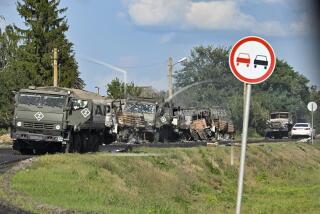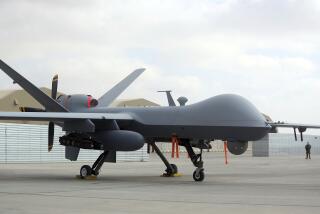Moscow Warns Commandos to Halt Baltic Tactics
- Share via
MOSCOW — Commanders of the Soviet Union’s elite internal security troops who briefly took over communications in the Lithuanian capital last week were summoned to Moscow and “seriously warned” that they must stop their wildcat tactics, according to reports Saturday.
The state-run Tass news agency said top Soviet Interior Ministry officials, who control the troops--commandos known as the “black berets”--called in senior officers from Lithuania on Friday to remind them that they must strictly observe the law and prevent “excesses against the republic’s population.”
The warning, although it apparently came closer to a slap on the hand than a condemnation, was the clearest indication so far that the black berets, who have repeatedly staged attacks in the independence-minded Baltic republics, were acting more on their own than at the Kremlin’s bidding.
The Interior Ministry officials also discussed strengthening Moscow’s control over the commandos, Tass said.
Moscow in the past refrained from openly disavowing the special forces, even after a foray on the Latvian Interior Ministry in that republic’s capital of Riga in January that left five dead. Fourteen people died in a similar attack by paratroopers on a television center in Lithuania earlier in January.
President Mikhail S. Gorbachev defended the soldiers after the January assault on the television center, to the dismay of Western leaders who viewed the attack and his justifications as signs of a shift toward a hard line.
But after the black berets’ raid last week on the telecommunications center in Vilnius, the Lithuanian capital, Gorbachev publicly ordered Boris K. Pugo, the Soviet interior minister, to investigate the circumstances.
Vitaly N. Ignatenko, the president’s press secretary, complained that with such attacks, conservative forces were undermining the Soviet president.
“The president was immediately informed about the events,” Ignatenko said of the raid. “He . . . urgently instructed (Pugo) to investigate the matter.
“It is hard to get away from the impression,” Ignatenko said, “that someone is trying by such provocative actions to spoil the atmosphere before the Soviet president’s meeting with leaders of the Group of Seven in London.”
Gorbachev is expected to request large-scale aid and investment from the West at a meeting of the leaders of the world’s major industrial democracies in less than three weeks; any sign of new conservatism on his part would probably hurt his chances to convince them of his sincere intention to make changes in the economy.
In further evidence that Gorbachev will not stand for more rampages by the black berets, the government newspaper Izvestia reported Friday that the general responsible for the police commandos in Lithuania was probably being transferred.
The black beret raid on the communications center Wednesday virtually cut Lithuania off from the outside world for more than two hours. The troops have also taken over a number of customs stations in Lithuania and neighboring Latvia and Estonia in recent weeks, prompting local officials to accuse the Kremlin of waging a war of nerves.
The black berets, formally known as Special Assignment Militia Units, are much hated in the Baltic region and are seen as the Kremlin’s main weapons against moves toward independence.
Although Interior Ministry officials rebuked the special force commanders in the meeting here Friday, they also asked their continued help in guarding Soviet property in the Baltics and ensuring “the unconditional observance of Soviet legislation and presidential decrees,” Tass reported.
The commandos have justified their actions against the customs posts as the enforcement of Soviet law; the posts were set up by the Baltic republics in defiance of Moscow’s refusal to recognize their independence.
The Baltic Council, which includes leaders of Latvia, Lithuania and Estonia, on Saturday protested the attack on the telephone center as another Soviet attempt to destabilize the region and punish it for its insistence on independence.
More to Read
Sign up for Essential California
The most important California stories and recommendations in your inbox every morning.
You may occasionally receive promotional content from the Los Angeles Times.










